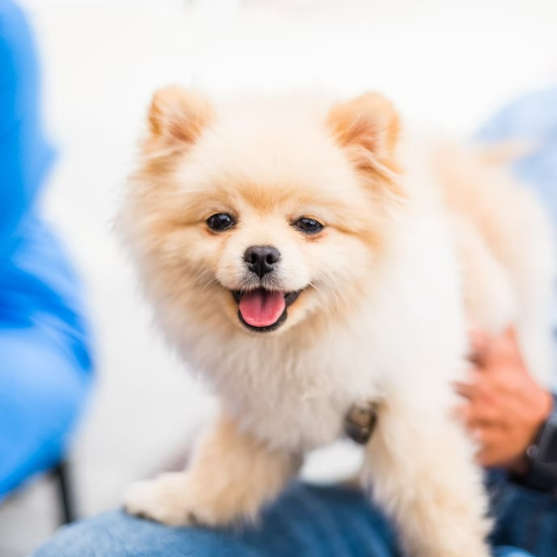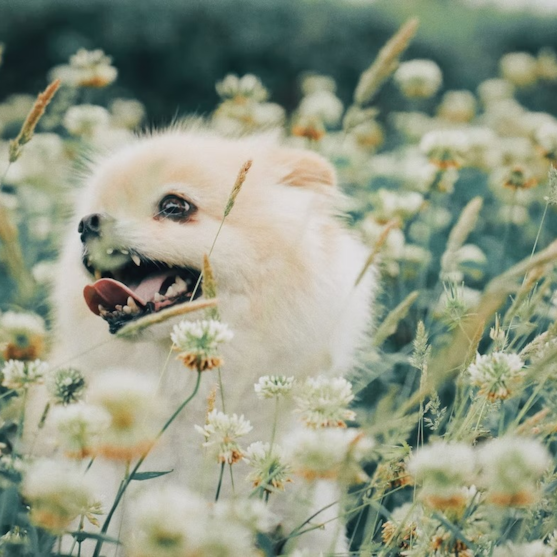Pomeranian Breed Information


Pomeranians are small, energetic, and lovable dogs that belong to the toy group. They are known for their distinctive, fluffy double coat and fox-like features, which have made them a favorite among pet owners and enthusiasts. With their compact size, ranging from 6 to 7 inches in height and weighing between 3 and 7 pounds, these tiny canines make ideal companions for apartment dwellers or those with limited space.
Pomeranians are intelligent and alert, which makes them both excellent watchdogs and quick learners. They have a curious nature, and while they may be small in size, they possess a big personality. Poms are known for their loyalty, affection, and playful demeanor, making them ideal for families, singles, and seniors alike. However, they can sometimes be stubborn and willful, which means consistent training and socialization are essential.
These fluffy companions come in various colors, including red, orange, cream, sable, black, chocolate, and blue, as well as different coat patterns, such as brindle and merle. The Pomeranian's coat requires regular grooming to maintain its appearance and prevent matting.
Characteristics
- Loyal: Pomeranians are known for their unwavering loyalty and devotion to their owners. They make excellent companions and are often referred to as "velcro dogs" due to their desire to be near their owners at all times.
- Energetic: Despite their small size, Pomeranians have plenty of energy and require regular exercise and playtime to stay healthy and happy.
- Playful: Pomeranians have a playful and curious nature, which makes them entertaining and endearing companions.
- Intelligent: Pomeranians are intelligent and capable of learning a variety of commands and tricks. They enjoy mental stimulation and training sessions.
- Alert: Pomeranians are highly alert and make excellent watchdogs. They are quick to sound the alarm if they sense danger or an unfamiliar presence.
- Affectionate: Pomeranians are affectionate dogs and love nothing more than snuggling up with their owners for some quality cuddle time.
- Vocal: Pomeranians are known for their vocalizations, which can include barking, growling, and whining. They may also "talk" to their owners, using various sounds to communicate.
- Independent: Pomeranians have an independent streak, which can make training a challenge. However, with consistent training and positive reinforcement, they can learn to follow commands and behave appropriately.
- Adaptable: Pomeranians are adaptable dogs and can thrive in a variety of living situations, from apartments to larger homes. They are also comfortable in a range of climates and weather conditions.
- Loving: Perhaps most importantly, Pomeranians are loving dogs that bring joy and companionship to their owners. They have an infectious spirit and an endearing personality that make them beloved pets.

Appearance
The Pomeranian breed is renowned for its striking appearance, characterized by its petite size, fox-like features, and luxurious double coat. These adorable dogs effortlessly captivate hearts with their distinctive looks and endearing expressions, making them a perennial favorite among dog enthusiasts.
Size and Weight: As members of the toy group, Pomeranians are small in stature, typically standing 6 to 7 inches tall at the shoulder and weighing between 3 and 7 pounds. Their compact size makes them ideal for apartment living or households with limited space, and they are easily portable, allowing them to accompany their owners on various outings and adventures.
Coat and Color: The Pomeranian's crowning glory is its magnificent double coat, which comprises a dense, soft undercoat and a long, straight, and abundant outer coat. This profuse fur forms a distinctive "mane" around the neck and chest area, giving the breed its characteristic "puffball" appearance. Regular grooming is essential to maintain the coat's health and prevent matting or tangling.
Pomeranians come in a wide array of colors and patterns, making them one of the most diverse breeds in terms of coat variety. Some common colors include red, orange, cream, sable, black, chocolate, and blue. There are also various patterns, such as brindle, merle, and parti-color, which add to the breed's aesthetic appeal.
Facial Features: The Pomeranian's face is characterized by its fox-like expression, which is both endearing and regal. They have dark, almond-shaped eyes that convey intelligence and curiosity, and small, triangular ears that stand erect, adding to their alert appearance. The breed's muzzle is short and straight, leading to a small, black nose. The overall facial structure of the Pomeranian exudes charm and character, making it impossible to resist their allure.
Tail and Body: The Pomeranian's body is compact and well-proportioned, with a level topline and a moderately broad chest. The breed's tail is a distinctive feature, set high and carried flat over the back, where it rests on the plush fur of the hindquarters. This tail carriage contributes to the breed's animated and spirited appearance.
Temperament
The Pomeranian breed boasts a delightful and spirited temperament that endears them to dog lovers everywhere. Despite their small stature, these tiny canines are packed with personality, exhibiting a range of characteristics that make them truly unique and engaging companions.
Pomeranians are known for their intelligence and alertness, which contribute to their excellent problem-solving skills and ability to learn commands quickly. They are inquisitive by nature, often displaying a curiosity and enthusiasm for exploring their surroundings. This innate curiosity, combined with their alertness, makes them proficient watchdogs, as they are quick to notify their owners of any unfamiliar presence or activity.
One of the most appealing aspects of the Pomeranian's temperament is their affectionate nature. They form strong bonds with their owners and thrive on human companionship. Poms are loyal and protective, always eager to be by their owner's side and shower them with love and attention. This devotion makes them excellent companions for families, singles, and seniors alike.
Pomeranians are also known for their lively and playful disposition. They enjoy engaging in interactive play and activities, such as fetch, agility, or obedience training. Despite their small size, they have plenty of energy and require regular mental and physical stimulation to keep them happy and healthy.
However, Pomeranians can also exhibit stubbornness and independence, which may present challenges during training. Consistency, patience, and positive reinforcement are essential in teaching these intelligent dogs to follow commands and curb undesirable behaviors.
Pomeranians are sociable animals, but early socialization is crucial to ensure they develop into well-rounded, confident adults. Exposure to various people, animals, and environments during their formative months will help them adjust to different situations and minimize any potential aggression or fearfulness.
The Pomeranian breed's temperament is a delightful blend of intelligence, affection, playfulness, and loyalty. With proper training, socialization, and ample love, these charming dogs make for devoted and engaging companions that bring joy and laughter to any household.
Care
Grooming
The Pomeranian's luxurious double coat and distinctive appearance require regular grooming and maintenance to keep them looking their best and to promote optimal coat health. By following a consistent grooming routine, you can ensure that your Pom remains clean, comfortable, and tangle-free.
Brushing: One of the most important aspects of grooming a Pomeranian is regular brushing. Ideally, you should brush your Pom's coat at least two to three times a week to remove loose hair, prevent matting, and distribute natural oils throughout the fur. Use a slicker brush or pin brush to gently work through the coat, paying special attention to areas prone to tangles, such as behind the ears, under the legs, and around the tail. For the dense undercoat, a rake or comb specifically designed for undercoats can be beneficial.
Bathing: Pomeranians typically require a bath every four to six weeks, or as needed, depending on their activity level and environment. Use a gentle, dog-specific shampoo to avoid irritating your Pom's skin and ensure that you thoroughly rinse out all soap to prevent residue buildup. After bathing, towel-dry your Pom and then use a hairdryer on a low heat setting to dry the coat completely, as dampness in the undercoat can lead to skin issues.
Trimming: While Pomeranians do not require extensive haircuts, occasional trimming can help maintain a neat appearance and prevent matting. Focus on areas such as the fur around the paw pads, which can become matted or collect debris, and the sanitary area for cleanliness. If you are unsure about trimming your Pom's coat, consult with a professional groomer for guidance.
Ear Care: Regular ear cleaning is essential for Pomeranians to prevent the buildup of wax, dirt, and debris, which can lead to infection. Use a dog-specific ear cleaning solution and a cotton ball or soft cloth to gently wipe the outer ear, being careful not to insert anything into the ear canal.
Nail Care: Pomeranian nails should be trimmed every three to four weeks, or as needed, to prevent overgrowth and discomfort. Use a dog-specific nail trimmer and be cautious not to cut the quick, which can cause pain and bleeding.
Dental Care: Good oral hygiene is vital for Pomeranians, as they are prone to dental issues. Brush your Pom's teeth at least two to three times a week using a dog-specific toothbrush and toothpaste. Regular dental check-ups and professional cleanings are also recommended to maintain optimal oral health.
Exercise Needs
Despite their small size, Pomeranians have plenty of energy and require regular exercise to maintain optimal health and wellbeing. While they do not require extensive exercise, they do benefit from daily activity and mental stimulation to keep them physically fit and mentally stimulated.
Playtime: Playtime is an essential component of a Pomeranian's exercise routine. They love interactive play and games, such as fetch, tug-of-war, and hide-and-seek. Toys, such as puzzle toys or treat-dispensing toys, are also great for providing mental stimulation.
Walks: Daily walks are an excellent way to provide your Pomeranian with exercise and fresh air. Aim for at least two 20-minute walks a day, depending on your Pom's age, fitness level, and health status. Walking can also provide an opportunity for socialization, allowing your Pom to meet other dogs and people.
Indoor Activities: Indoor activities, such as playing with toys or agility equipment, can be beneficial for Pomeranians during inclement weather or for owners who are unable to take their dogs on regular walks. Activities that involve climbing, jumping, or running can help burn off excess energy and stimulate both physical and mental well-being.
Training: Training sessions can also double as exercise for Pomeranians. Obedience training, agility training, or trick training are all excellent ways to keep your Pom mentally stimulated and engaged. Additionally, training can help improve your Pom's behavior and manners, making them better-behaved companions.
It's important to note that Pomeranians are not built for intense physical activity, such as long-distance running or extended periods of high-intensity exercise. Over-exertion can lead to health issues such as joint problems, respiratory issues, and heat exhaustion. Always monitor your Pom's activity level, providing breaks and ample water to keep them comfortable.
Health
The Pomeranian breed is generally a healthy one, but like all dog breeds, they are prone to certain health issues that owners should be aware of. By understanding the common health concerns of Pomeranians and taking preventative measures, owners can help ensure their Poms live happy and healthy lives.
Dental Health: Pomeranians are prone to dental issues, such as periodontal disease and tooth decay. Regular dental care, including brushing, dental chews, and professional cleanings, can help prevent these issues and maintain good oral hygiene.
Eye Issues: Pomeranians are prone to eye issues, such as cataracts which can cause blindness in old age. Regular eye exams can help detect these issues early on and prevent further damage.
Allergies: Pomeranians can develop allergies, which can cause skin irritation, itching, and discomfort. Identifying and avoiding allergens and providing proper care, such as regular grooming and specialized diets, can help manage allergies.
Regular veterinary check-ups and a healthy diet and exercise routine can help prevent and manage these issues.
Lifespan
Pomeranians are a relatively long-lived breed, with an average lifespan of 12 to 16 years. With proper care, some Pomeranians have been known to live even longer, with some reaching the age of 20 or more.
Factors that can influence a Pomeranian's lifespan include genetics, diet, exercise, and overall health. While some health issues are common in the breed, proper preventative care, such as regular veterinary check-ups, a healthy diet, and exercise routine, can help extend a Pomeranian's lifespan.
Pomeranians that are overweight or have poor diets may be at a higher risk of developing health issues, such as diabetes and heart disease, which can shorten their lifespan. Maintaining a healthy weight and providing a balanced and nutritious diet can help prevent these issues and promote overall health.
Regular exercise is also important for maintaining a Pomeranian's physical and mental wellbeing. Lack of exercise can lead to obesity, joint problems, and other health issues. Daily walks, playtime, and mental stimulation can help keep a Pomeranian healthy and happy.
In addition to proper care, genetics can play a significant role in a Pomeranian's lifespan. Reputable breeders can provide information on a dog's lineage, which can help identify potential health issues and increase the likelihood of a longer lifespan.
Training
Pomeranians are intelligent and trainable dogs, capable of learning a wide variety of commands and tricks. However, like all dogs, Pomeranians have their unique challenges, and training requires patience, consistency, and positive reinforcement.
Socialization: Socialization is a crucial aspect of training for Pomeranians. Early and ongoing exposure to different people, animals, and environments can help prevent fearfulness, aggression, and other behavioral issues. Socialization should begin during the puppy stage and continue throughout the dog's life.
Basic Commands: Teaching basic commands, such as sit, stay, come, and down, is an essential part of Pomeranian training. Positive reinforcement techniques, such as treats and praise, can be used to encourage desired behaviors. Consistency and repetition are essential for successful training.
Leash Training: Leash training is another important aspect of Pomeranian training. Pomeranians are small and delicate, and proper leash training can help prevent injury and ensure their safety during walks. Start with short, controlled walks and gradually increase the distance and duration as your Pom becomes more comfortable.
Housebreaking: Housebreaking a Pomeranian can be a challenge, but with consistency and patience, it is achievable. Crate training and establishing a routine can help with housebreaking. Frequent trips outside, praise for successful elimination, and discouraging accidents indoors can also aid in the process.
Behavioral Issues: Pomeranians can exhibit behavioral issues, such as barking, digging, and chewing. These issues can often be corrected through proper training, such as teaching the "quiet" command or providing appropriate chew toys. Positive reinforcement and consistency are key to correcting undesirable behaviors.
History
The history of the Pomeranian breed dates back to the 18th century, originating from the Pomerania region, which is now part of modern-day Germany and Poland. These charming dogs were initially much larger, weighing up to 30 pounds, and were primarily used for herding livestock and as reliable guard dogs. Their ancestry can be traced back to the ancient Spitz dogs, which were the foundation for many Nordic breeds we know today.
The Pomeranian's journey to fame began when they captured the hearts of European royalty. Queen Charlotte, the wife of King George III of England, was among the first to own and promote Pomeranians. However, it was Queen Victoria, their granddaughter, who truly elevated the breed's popularity in the 19th century. A passionate dog lover, Queen Victoria established a breeding program for Pomeranians and sought to reduce their size, making them more suitable as companion animals. Her efforts were successful, and the modern-day Pomeranian weighs significantly less than its ancestors.
As the Pomeranian breed gained recognition, it also caught the attention of famous figures like composer Wolfgang Amadeus Mozart and scientist Isaac Newton, who both owned and cherished Pomeranians.
In the late 19th century, the breed made its way to the United States, and the American Kennel Club (AKC) officially recognized the Pomeranian in 1900. Since then, the breed has continued to grow in popularity, ranking among the top 25 most popular dog breeds in the United States. Pomeranians have also made a name for themselves in dog shows, with the first Pom winning Best in Show at the prestigious Westminster Kennel Club Dog Show in 1988.
Throughout their history, Pomeranians have transformed from hardworking herding dogs to beloved companion animals, charming countless individuals with their intelligence, playfulness, and affectionate nature. Their rich history and strong connection with notable figures have solidified the Pomeranian breed as a timeless favorite among dog enthusiasts worldwide.





